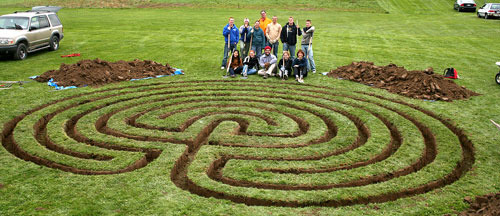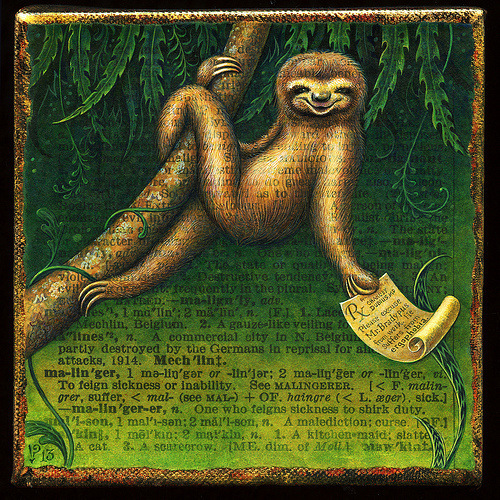Short & Sweet Treats discussion
Take a Coffee Break...
>
Word of the Day
message 101:
by
Ƹ̴Ӂ̴Ʒ Jenn Ƹ̴Ӂ̴Ʒ
(new)
Nov 13, 2013 07:55PM
 I harried with my pet chimera :)
I harried with my pet chimera :)
reply
|
flag
 mulligan
mulliganPRONUNCIATION:
(MUHL-i-guhn)
MEANING:
noun:
1. A second chance, especially in golf where a player is sometimes given another shot to make up for a poor shot which is not counted.
2. A stew made from odds and ends, using whatever is available.
ETYMOLOGY:
Both senses of the word are from the name Mulligan. It's not certain who these two Mulligans were -- maybe a golf player and a chef. Earliest documented use: 1936.
USAGE:
"It's the Do-Over Derby, in which the only candidates not asking for a mulligan are the ones demanding dozens of them."
Frank Bruni; The Do-Over Derby; The New York Times; Feb 13, 2012.
 rube
rubePRONUNCIATION:
(roob)
MEANING:
noun: An unsophisticated person from a rural area.
ETYMOLOGY:
Shortened form of name Reuben. Earliest documented use: 1891. Also see hey rube.
USAGE:
"Is he simply some rube, an easy target for fast-talking telephone magazine salespeople?"
Kevin Prokosh; Normal is Overrated; Winnipeg Free Press (Canada); Oct 18, 2013.
 HORNSWOGGLE
HORNSWOGGLEhorn•swog•gle
bamboozle, hoax
Examples of HORNSWOGGLE
"I think we've been hornswoggled by that carnival barker."
Hmm, maybe that carnival barker was hornswoggling some rubes :-)
 :-) For sure! Which brings me to:
:-) For sure! Which brings me to: BALDERDASH
(bôldr-dsh)
Nonsense.
My grammar students loved playing our version of "Balderdash", where I'd send 4 of them into the hall with dictionaries and they'd come back in to try and trick their classmates. We'd be in stitches AND they learned vocabulary :-)
 implacable
implacablePRONUNCIATION:
(im-PLAK-uh-buhl, -PLAY-kuh-)
MEANING:
adjective: Impossible to pacify or appease.
ETYMOLOGY:
From Latin placare (to quiet or appease). Ultimately from the Indo-European root plak- (to be flat), which is also the source of fluke, flake, flaw, plead, please, supple, supplicatory, and archipelago. Earliest documented use: 1522.
USAGE:
"Big issues that pit a single, powerless individual against a vast, implacable adversary have inspired some of his most memorable novels."
 Julia wrote: "HORNSWOGGLE
Julia wrote: "HORNSWOGGLEhorn•swog•gle
bamboozle, hoax
Examples of HORNSWOGGLE
"I think we've been hornswoggled by that carnival barker."
Hmm, maybe that carnival barker was hornswoggling some rubes :-)"
Good word!
here's one from the phobia list. again. nothing I would suffer from!
Plutophobia- Fear of wealth
Plutophobia- Fear of wealth
 ser·en·dip·i·ty (srn-dp-t)
ser·en·dip·i·ty (srn-dp-t) 1. The faculty of making fortunate discoveries by accident.
2. The fact or occurrence of such discoveries.
3. An instance of making such a discovery.
Word History: We are indebted to the English author Horace Walpole for the word serendipity, which he coined in one of the 3,000 or more letters on which his literary reputation primarily rests. In a letter of January 28, 1754, Walpole says that "this discovery, indeed, is almost of that kind which I call Serendipity, a very expressive word." Walpole formed the word on an old name for Sri Lanka, Serendip. He explained that this name was part of the title of "a silly fairy tale, called The Three Princes of Serendip: as their highnesses traveled, they were always making discoveries, by accidents and sagacity, of things which they were not in quest of...."
http://www.thefreedictionary.com/sere...
 Julia wrote: "ser·en·dip·i·ty (srn-dp-t)
Julia wrote: "ser·en·dip·i·ty (srn-dp-t) 1. The faculty of making fortunate discoveries by accident.
2. The fact or occurrence of such discoveries.
3. An instance of making such a discovery.
Word History:..."
A pretty word
 EUPHONY and CACAPHONY
EUPHONY and CACAPHONY"Euphony is used most commonly to describe the pleasing, agreeable sound effect of poetry. In general, vowel sounds are more euphonious. Cacophony, meaning harsh and discordant, is the opposite of euphony. Cacophony comes from the Greek word parts meaning “bad,” “evil,” and “voice.”
http://blog.dictionary.com/cellar-door/
 primrose path
primrose pathPRONUNCIATION:
(PRIM-rohz PATH)
MEANING:
noun:
1. An easy life, especially devoted to sensual pleasure.
2. A path of least resistance, especially one that ends in disaster.
ETYMOLOGY:
From Latin prima rosa (first rose). Earliest documented use: 1604.
NOTES:
It's not clear why primrose was picked for naming this metaphorical path. Perhaps Shakespeare chose the word for alliteration -- the word is first attested in his Hamlet where Ophelia says to her brother Laertes:
"Do not, as some ungracious pastors do,
Show me the steep and thorny way to heaven,
Whilst, like a puff'd and reckless libertine,
Himself the primrose path of dalliance treads,
And recks not his own rede." [Heeds not his own counsel.]
 FORFEND
FORFEND1. to ward off : prevent
2. protect, preserve
EXAMPLE
"'Sir!' Scotty sounded genuinely indignant. 'You're not suggesting that I would let any piece of equipment aboard my ship fall into disrepair, are you?' 'Heaven forfend, Scotty,' Kirk answered, successfully keeping the smile he wore from his voice." — From William Leisner's 2013 book Star Trek: The Original Series: The Shocks of Adversity
 amaranthine
amaranthinePRONUNCIATION:
(am-uh-RAN-thin, -thyn)
MEANING:
adjective
1. Unfading; everlasting.
2. Of deep purple-red color.
3. Of or related to the amaranth.
ETYMOLOGY:
From amaranth (an imaginary, undying flower), from Latin amarantus, from Greek amarantos (unfading), from a- (not) + marainein (to fade). Ultimately from the Indo-European root mer- (to rub away or to harm), which is also the source of morse, mordant, amaranth, morbid, mortal, mortgage, nightmare, ambrosia, and premorse. Earliest documented use: 1667.
USAGE:
"Garda has retained its amaranthine appeal as one of the continent's most timeless getaways."
 Love that word, Jen--very magical! This image sums up how the word made me feel :-)
Love that word, Jen--very magical! This image sums up how the word made me feel :-)
http://pictify.com/190783/amaranthine
 Julia wrote: "Love that word, Jen--very magical! This image sums up how the word made me feel :-)
Julia wrote: "Love that word, Jen--very magical! This image sums up how the word made me feel :-)http://pictify.com/190783/amaranthine"
Very pretty :)
 BELLADONNA
BELLADONNAItalian, literally, "beautiful lady"
First Known Use: 1597
1. an Old World poisonous plant (Atropa belladonna) of the nightshade family having purple or green bell-shaped flowers, glossy black berries, and root and leaves that yield atropine —called also deadly nightshade
2. a medicinal extract (as atropine) from the belladonna plant
Julia wrote: "BELLADONNA
Italian, literally, "beautiful lady"
First Known Use: 1597
ohhhhh why thank you, Julia. oh you meant...
how embarrassing!
Italian, literally, "beautiful lady"
First Known Use: 1597
ohhhhh why thank you, Julia. oh you meant...
how embarrassing!
 curate's egg
curate's eggPRONUNCIATION:
(KYOOR-itz eg)
MEANING:
noun: Something having both good and bad parts.
ETYMOLOGY:
From a cartoon in Punch magazine (London, UK) in which a timid curate (a junior clergy member), when served a stale egg at a bishop's table, tries to assure his host that parts of the egg are edible. Earliest documented use: 1905.
USAGE:
"After another curate's egg of a performance, he, we, and probably Hodgson are none the wiser as to whether he will be in the team this time."
Glenn Moore; Michael Carrick Gives Steven Gerrard the Freedom to Roam; The Independent (London, UK); Oct 16, 2013.
 FLAPDOODLE
FLAPDOODLEflap·doo·dle
noun \ˈflap-ˌdü-dəl\
MEANING: foolish words
Example:
The speech was a lot of flapdoodle about the economy.
origin unknown
First Known Use: 1878
. Atavistic: relating to the behavior of
one’s ancestors in the distant past; The
chieftain urged his tribe to curb their
atavistic urges and refrain from
unnecessary violence
one’s ancestors in the distant past; The
chieftain urged his tribe to curb their
atavistic urges and refrain from
unnecessary violence
 blimp
blimpPRONUNCIATION:
(blimp)
MEANING:
noun: A pompous reactionary with out-of-date views.
ETYMOLOGY:
After Colonel Blimp, a cartoon character created by David Low (1891-1963). Blimp was a satirical look at the self-important and ultra-nationalistic attitudes of officials in the British army and government. Earliest documented use: 1934.
USAGE:
"Yet, far from being a blimp, Charles Napier was one of the most impressive and intelligent individuals the British armed forces have ever produced."
Frank McLynn; The Road Not Taken; Random House; 2012.
I know. I associate it with feeling full after Thanksgiving. so nice to see this actual definition.
I guess you can see it as someone who is "full" ...
of themselves!
I guess you can see it as someone who is "full" ...
of themselves!
 felicitous
felicitousPRONUNCIATION:
(fi-LIS-i-tuhs)
MEANING:
adjective: 1. Well suited. 2. Pleasing.
ETYMOLOGY:
From Latin felix (happy). Earliest documented use: 1641.
USAGE:
"As good actors age -- perhaps a more felicitous word would be mature -- they learn how to do more with less."
Charles Isherwood; A Literary Life Can Turn Lonely When the Cheering Stops; The New York Times; Apr 29, 2010.
 SAGARMATHA
SAGARMATHAnoun
the Nepalese name for (Mount) Everest
Example:
"The name of the world's highest peak in Nepali language is सगरमाथा, Sagarmāthā. A renowned Nepali historian, Babu Ram Acharya, named the mountain: Sagarmatha, which literally means 'head on or above the sky or heaven'."
http://thehimalayanvoice.blogspot.com...
 disprize
disprizePRONUNCIATION:
(dis-PRYZ)
MEANING:
verb tr.: To disdain or scorn.
ETYMOLOGY:
From Old French desprisier (dispraise), from Latin pretium (price, worth, or reward). Ultimately from the Indo-European root per- (to traffic in, to sell) which also gave us praise, price, precious, appreciate, appraise, and interpret. Earliest documented use: 1480.
USAGE:
"And disprize them [jingles] as we might, they are an art form."
James Parker; Let Us Now Praise... Jingles; The Boston Globe; Dec 6, 2009.
 LABYRINTHINE
LABYRINTHINE[lab-uh-rin-thin, -theen]
adjective
1. of, pertaining to, or resembling a labyrinth.
2. complicated; tortuous:
"the labyrinthine byways of modern literature"
 Julia wrote: "LABYRINTHINE
Julia wrote: "LABYRINTHINE[lab-uh-rin-thin, -theen]
adjective
1. of, pertaining to, or resembling a labyrinth.
2. complicated; tortuous:
"the labyrinthine byways of modern literature""
An awesome movie with David Bowie!
 You're so right, LOVE that film. But I love labyrinths themselves even more :-) I built a 7 circuit labyrinth in my backyard at my old house, and I've given several presentations on labyrinths. They're not mazes, since there's only one path in and out, but today they're being used at churches, colleges, and hospitals as a form of walking meditation.
You're so right, LOVE that film. But I love labyrinths themselves even more :-) I built a 7 circuit labyrinth in my backyard at my old house, and I've given several presentations on labyrinths. They're not mazes, since there's only one path in and out, but today they're being used at churches, colleges, and hospitals as a form of walking meditation. This is the bulb labyrinth at Cornell, being dug:

And here it is the next spring, with 15,000 bulbs in bloom :-)

 27 Delightful Obsolete Words It’s High Time We Revived:
27 Delightful Obsolete Words It’s High Time We Revived:http://www.buzzfeed.com/lukelewis/27-...
I had a crapulous life in my 20s.
I am easily jargogled.
As I live in Florida, I long for apricity.
My hair on a daily basis is in a state of elflock.
When I met my husband, I was gorgonized.
 Great list, Jen :-) I found this site for "Obsolete Word of the Day", and chose:
Great list, Jen :-) I found this site for "Obsolete Word of the Day", and chose:HALCYON DAYS
http://obsoleteword.blogspot.com/2006...
"Halcyon comes from alcyon, a bird in Greek legend commonly considered to be the kingfisher. The h was tacked onto alcyon because of the association with the sea, which is hals in Greek.
Aeolus was the ruler of the winds. He had a daughter Alcyone who was married to the king of Thessaly, Ceyx. Ceyx drowned at sea and in her grief, Alcyone threw herself into the sea. Her father, the ruler of the winds, instead carried her to her husband. The gods changed them into winter birds. Around the winter solstice, the ocean calms and for fourteen days, Alcyone will sit on her floating nest out at sea and hatch out more little kingfishers.
Halcyon means calm and tranquil, happy and carefree; but it is rarely used outside the phrase halcyon days. Halcyon days, those 14 days that the weather is calm around the winter solstice. Seven days before and seven after."
Julia wrote: "Great list, Jen :-) I found this site for "Obsolete Word of the Day", and chose:
HALCYON DAYS
http://obsoleteword.blogspot.com/2006...
"Halcyon comes from alcyon, a bird in Gree..."
I like to make sure I drink "Adam's Wine" on a daily basis! ;)
HALCYON DAYS
http://obsoleteword.blogspot.com/2006...
"Halcyon comes from alcyon, a bird in Gree..."
I like to make sure I drink "Adam's Wine" on a daily basis! ;)
 Julia wrote: "Great list, Jen :-) I found this site for "Obsolete Word of the Day", and chose:
Julia wrote: "Great list, Jen :-) I found this site for "Obsolete Word of the Day", and chose:HALCYON DAYS
http://obsoleteword.blogspot.com/2006...
"Halcyon comes from alcyon, a bird in Gree..."
We have more than 14 days of winter calm in Florida. ;)
 malinger
malingerPRONUNCIATION:
(muh-LING-guhr)
MEANING:
verb intr.: To feign illness in order to avoid work.
ETYMOLOGY:
From French malingre (sickly). Earliest documented use: 1820.
USAGE:
"Generally, staff did not malinger. Staff earned every penny they were paid by working seriously at their jobs. They appeared to enjoy their work and looked forward to being at work."
Azubike Uzoka; Growing Up, Growing Old; iUniverse; 2011.

Books mentioned in this topic
The Clicking of Cuthbert (other topics)The Crucible (other topics)
A History of Modern Drama, Volume I (other topics)
Toy Stories: Photos of Children from Around the World and Their Favorite Things (other topics)
The Book of Life (other topics)
More...
Authors mentioned in this topic
Leo Tolstoy (other topics)P.G. Wodehouse (other topics)
Leonardo da Vinci (other topics)
Theodore Roethke (other topics)
David Krasner (other topics)
More...




